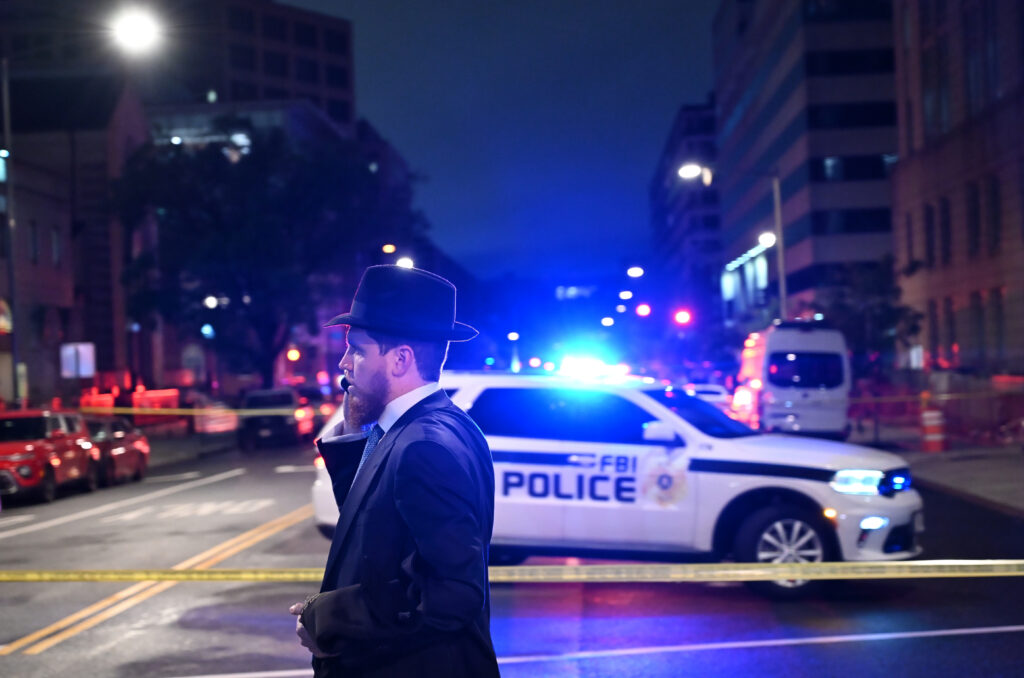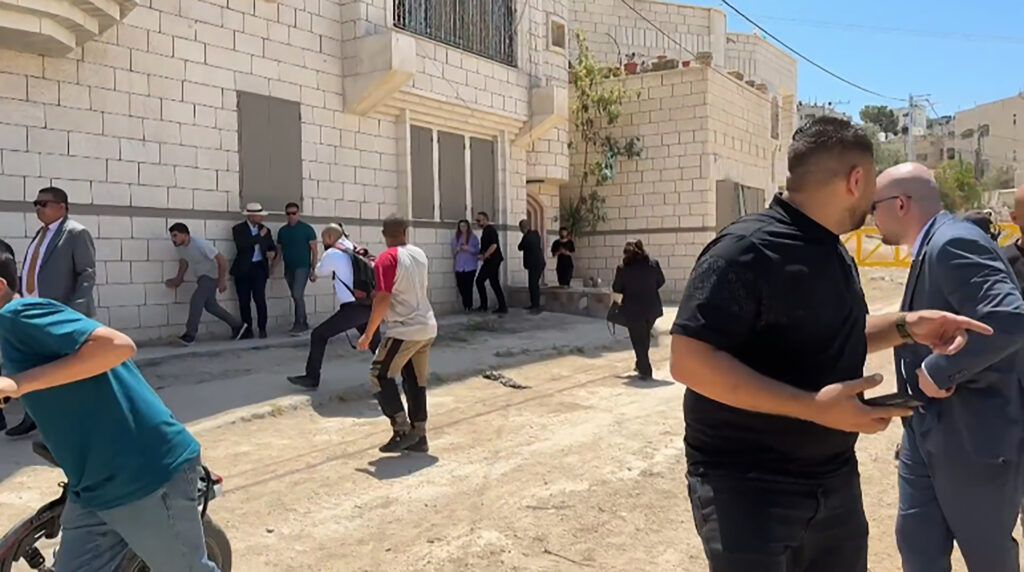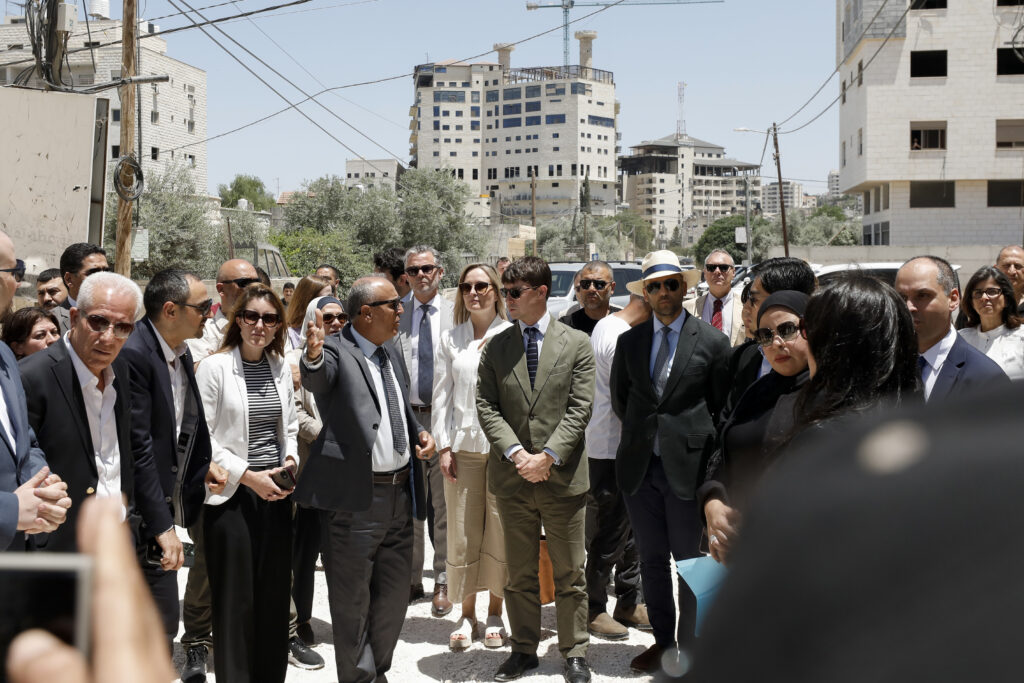AFP Asia Business
Two Israeli staff shot dead outside Jewish museum in Washington
Two Israeli embassy staffers were shot dead late Wednesday outside a Jewish museum in Washington by a gunman who shouted “free Palestine,” authorities said, with US officials and Israeli diplomats expressing shock and outrage over the killings.President Donald Trump quickly condemned the attack, saying “These horrible D.C. killings, based obviously on antisemitism, must end, NOW!””Hatred and Radicalism have no place in the USA,” he posted on social media.US Secretary of State Marco Rubio said “this was a brazen act of cowardly, antisemitic violence. Make no mistake: we will track down those responsible and bring them to justice.”Gunfire broke out on the sidewalk outside the Capital Jewish Museum and Washington police confirmed the suspected shooter then walked into the museum after the shooting and had been detained.”We believe the shooting was committed by a single suspect who is now in custody,” Washington Police Chief Pamela Smith told reporters.”Prior to the shooting the suspect was observed pacing back and forth outside of the museum. He approached a group of four people, produced a handgun and opened fire.”After the shooting the suspect then entered the museum and was detained by event security.”She said that the handcuffed suspect identified where he had discarded the weapon and chanted “Free, free Palestine.”Police identified him as Elias Rodriguez, 30, from Chicago.”The fatal shooting that took place outside the event that took place at the Jewish Museum in Washington, D.C… is a depraved act of anti-Semitic terrorism,” Danny Danon, Israel’s ambassador to the United Nations, said.”Harming diplomats and the Jewish community is crossing a red line.”We are confident that the US authorities will take strong action against those responsible for this criminal act. Israel will continue to act resolutely to protect its citizens and representatives — everywhere in the world.”Police Chief Smith said during a news conference that officers responded to multiple calls of a shooting near the museum at around 9:00 pm on Wednesday evening (0100 GMT Thursday). When authorities arrived at the scene, a man and a woman were found unconscious and not breathing. Despite life-saving efforts from first responders, both were pronounced dead.Emergency response vehicles remained at the scene into Thursday morning after police taped off the area.”We’re going to stand together as a community in the coming days and weeks to send the clear message that we will not tolerate anti-Semitism,” Mayor Muriel Bowser told reporters.”There is no active threat in our community. What I do know is that the horrific incident is going to frighten a lot of people in our city, and in our country. I want to be clear that we will not tolerate this violence or hate.”
Outrage at Israeli shots as diplomats tour West Bank
Several nations that have backed Israel voiced outrage Wednesday after Israeli troops fired what they called “warning shots” as foreign diplomats visited the occupied West Bank.The Palestinian Authority accused troops of “deliberately” shooting at the delegation near the flashpoint city of Jenin. The Israeli military, already under pressure over its tactics in the Gaza war, said it regretted the “inconvenience”.AFP footage from Jenin — a frequent target of Israeli military raids — showed the delegation and accompanying journalists running for cover as shots were heard.A European diplomat said the envoys went to the area to see the destruction caused by Israeli military raids since the Gaza war erupted in October 2023.The Israeli military said the diplomatic convoy strayed from the approved route and entered a restricted zone.Troops fired “warning shots” to steer the group away, it said, adding that no one was wounded and expressing regret for the “inconvenience caused”.UN Secretary-General Antonio Guterres’s spokesman called the incident “unacceptable”.”Diplomats who are doing their work should never be shot at, attacked in any way, shape or form. Their safety, their viability, must be respected at all times,” the spokesman, Stephane Dujarric, told reporters.”These diplomats, including UN personnel, were fired at, warning shots or whatever… which is unacceptable.”- Countries condemn shooting -Several countries that had representatives in the group voiced outrage and demanded an investigation.European Union foreign policy chief Kaja Kallas urged Israel to hold those responsible “accountable”.Belgium, Canada, France, Germany, Italy, the Netherlands, Portugal, Spain and Uruguay summoned Israel’s ambassadors or said they would raise the issue directly.Canadian Prime Minister Mark Carney called the incident “totally unacceptable” and pressed for an “immediate explanation”.Carney added that Canada’s Foreign Minister Anita Anand has summoned Israel’s ambassador to Ottawa.Egypt denounced the shooting as a breach of “all diplomatic norms”, while Turkey demanded an immediate investigation.Turkey’s foreign ministry said: “This attack must be investigated without delay and the perpetrators must be held accountable.”Ahmad al-Deek, political adviser for the Palestinian foreign ministry who accompanied the delegation, condemned “this reckless act by the Israeli army”.”It has given the diplomatic delegation an impression of the life the Palestinian people are living,” he said.Palestinian news agency Wafa reported the delegation included diplomats from more than 20 countries including Britain, China, Egypt, France, Japan, Jordan, Turkey and Russia.Japan’s government confirmed Thursday that its diplomatic staff participated, adding that it “deeply regrets” the incident.”The Japanese government has protested to the Israeli side and requested an explanation and the prevention of a recurrence,” government spokesman Yoshimasa Hayashi said in Tokyo.- ‘Painful’ Gaza plight -The incident came as anger mounted over the humanitarian crisis in Gaza, where Palestinians are scrambling for basic supplies after weeks of near-total isolation.A two-month Israeli aid blockade on Gaza has been partially eased this week.Israel stepped up its military offensive at the weekend, vowing to defeat Gaza’s Hamas rulers, whose October 7, 2023 attack on Israel triggered the war.Israel has faced massive pressure, including from its allies, to halt its intensified offensive and allow aid into Gaza.European Union foreign ministers on Tuesday ordered a review of the EU cooperation accord with Israel.Sweden said it would press the EU to impose sanctions on Israeli ministers, while Britain suspended free-trade negotiations with Israel and summoned the Israeli ambassador.Pope Leo XIV described the situation in Gaza as “worrying and painful” and called for “the entry of sufficient humanitarian aid”.Hamas’s 2023 attack resulted in the deaths of 1,218 people in Israel, mostly civilians, according to an AFP tally based on official figures.Militants also took 251 hostages, 57 of whom remain in Gaza including 34 the military says are dead.Gaza’s health ministry said at least 3,509 people have been killed since Israel ended a ceasefire and resumed strikes on March 18, taking the war’s overall toll to 53,655, mostly civilians.burs-stu/rsc
UN says around 90 aid trucks ‘dispatched’ into Gaza
The UN said Wednesday it had “dispatched” around 90 trucks carrying aid into Gaza, as international pressure intensified over Israel’s renewed offensive and blockade of the war-ravaged Palestinian territory.The first aid distribution in Gaza since early March came as Israeli Prime Minister Benjamin Netanyahu said he was open to a “temporary ceasefire”, but reaffirmed the military aimed to bring the entire territory under its control. Three days after Israel announced it would allow in limited aid, the United Nations “collected around 90 truckloads of goods from the Kerem Shalom crossing and dispatched them into Gaza”, said Stephane Dujarric, spokesman for UN chief Antonio Guterres.The development came hours after Israeli troops fired what the military called “warning shots” near a delegation of foreign diplomats visiting the occupied West Bank, triggering global condemnation.In Gaza, the Hamas government media office reported the arrival of 87 aid trucks, which it said were allocated to international and local organisations to meet “urgent humanitarian needs”.Netanyahu said it was necessary to “avoid a humanitarian crisis in order to preserve our freedom of operational action” in Gaza.Palestinians have been scrambling for basic supplies after weeks of near-total isolation, with Israel’s blockade leading to critical food and medicine shortages.Israel has meanwhile kept up its bombardment, with Gaza’s health ministry reporting Wednesday that the bodies of 82 people were taken to hospitals across the territory over the previous 24 hours.- ‘Barely’ one daily meal -Umm Talal al-Masri, 53, a displaced Palestinian in Gaza City, described the situation as “unbearable”.”No one is distributing anything to us. Everyone is waiting for aid, but we haven’t received anything,” she said.”We barely manage to prepare one meal a day.”Humanitarian groups have said that the amount of aid entering Gaza falls far short of what is required to ease the crisis.A US-backed private group, the Gaza Humanitarian Foundation, that will use contractors, said that it will start moving aid into the territory in “coming days”. The United Nations and traditional agencies have said they will not cooperate with the foundation which some have accused of working with Israel.The GHF has said it will distribute some 300 million meals in its first 90 days of operation.- Pressure on Israel -The army stepped up its offensive at the weekend, vowing to defeat Gaza’s Hamas rulers, whose October 7, 2023 attack on Israel triggered the war.Israel has faced mounting pressure, including from traditional allies, to halt its expanded offensive and allow aid into Gaza.European Union foreign ministers agreed on Tuesday to review the bloc’s cooperation accord, which includes trade, with Israel.Israel’s foreign ministry has said the EU action “reflects a total misunderstanding of the complex reality Israel is facing”.Sweden said it would press the 27-nation bloc to impose sanctions on Israeli ministers, while Britain suspended free-trade negotiations with Israel and summoned the Israeli ambassador.Pope Leo XIV described the situation in Gaza as “worrying and painful” and called for “the entry of sufficient humanitarian aid”.Germany defended a key EU-Israel cooperation deal as “an important forum that we must use in order to discuss critical questions” over the situation in Gaza.In Gaza, Israel resumed its operations across the territory on March 18, ending a two-month ceasefire.Hamas’s October 2023 attack resulted in the deaths of 1,218 people in Israel, mostly civilians, according to an AFP tally based on official figures.Militants also took 251 hostages, 57 of whom remain in Gaza including 34 the military says are dead.Netanyahu said Israel would be ready “if there is an option for a temporary ceasefire to free hostages”, noting that at least 20 held by Hamas and its allies were still believed to be alive.Gaza’s health ministry said at least 3,509 people have been killed since Israel resumed strikes on March 18, taking the war’s overall death toll to 53,655, mostly civilians.In neighbouring Lebanon, authorities said Israeli strikes killed three people on Wednesday as Israel said it targeted Hamas’s allies Hezbollah in the south — the latest in a series of attacks despite a ceasefire with the Iran-backed militant group there.
War takes centre stage as Lebanon’s theatres are back
As Lebanon suffered a war last year, Ali Chahrour was determined to keep making art, creating a performance inspired by the plight of migrant workers caught up in the conflict.Months after a ceasefire largely halted the fighting between Israel and the Lebanese militant group Hezbollah, Chahrour’s work premiered in Beirut in early May with plans to take it to stages across Europe including at France’s famed Avignon Festival.”This project was born during the war,” said the 35-year-old playwright and choreographer.”I did not want to stop making theatre, because I don’t know how to fight or carry weapons, I only know how to dance.”On stage, two Ethiopian domestic workers and a Lebanese Ethiopian woman speak, sing and dance, telling stories of exile and mistreatment in “When I Saw the Sea”, directed by Chahrour.The play pays tribute to the migrant women who were killed or displaced during the two-month war between Israel and Hezbollah which ended in November, and the year of hostilities that preceded it.Hundreds of migrant workers had sought refuge in NGO-run shelters after being abandoned by employers escaping Israeli bombardment.Others were left homeless in the streets of Beirut while Lebanon’s south and east, as well as parts of the capital, were under attack.Chahrour said that “meeting with these women gave me the strength and energy to keep going” even during the war, seeking to shed light on their experience in Lebanon which is often criticised for its poor treatment of migrant workers.- ‘Escape and therapy’ -The war has also shaped Fatima Bazzi’s latest work, “Suffocated”, which was shown in Beirut in May.It was revised after the 32-year-old playwright was displaced from her home in Beirut’s southern suburbs, a Hezbollah stronghold heavily bombarded during the war.The play originally portrayed a woman dealing with her misogynistic husband, and was reshaped by Bazzi’s own experience, forced to escape to Iraq until the ceasefire was finally reached.Determined to continue the project the moment she returned to Lebanon, Bazzi had kept in contact with the cast in video calls.”We took advantage of this in the performance, the idea of separation and distance from each other, how we worked to continue the play,” she told AFP during a recent rehearsal.At one point in the play, the characters are suddenly interrupted by the sound of a bomb and rush to their phones to see what was hit this time, with their reactions becoming scenes of their own.To Bazzi, working on the play has allowed her and the cast to “express the things we felt and went through, serving as an escape and therapy”.- ‘Children of war’ -Theatre stages across Lebanon did not lift their curtains during the war, and though they are now back, the local scene is still burdened by the effects of a devastating economic crisis since 2019.”We postponed an entire festival at the end of last year due to the war,” said Omar Abi Azar, 41, founder of the Zoukak collective.The group runs the theatre where Bazzi’s latest piece was performed.”Now we have started to pick up the pace” again, said Abi Azar, whose own play was postponed by the war.”Stop Calling Beirut”, which Abi Azar created with his collective, tells the story of the loss of his brother more than a decade ago and their childhood memories during Lebanon’s civil war, which ended in 1990.Zoukak itself was born out of a crisis during a previous war between Hezbollah and Israel in 2006.”We are children of war. We were born, raised and grew up in the heart of these crises,” said Abi Azar.To him, “this is not a challenge, but rather our reality”.”If this reality wanted to pull us down, it would have dragged us, buried us and killed us a long time ago,” he added, seeking hope in art.
Students chant ‘Free Mahmoud’ at Columbia University graduation
There was one notable — and loudly noted — absence on Wednesday at Columbia University’s graduation ceremony: detained pro-Palestinian student protest leader Mahmoud Khalil.”Boo… Shame on you!” students chanted when Clare Shipman, interim president of the prestigious New York City school, took the podium.Columbia has been the site of demonstrations calling for an end to violence in Gaza for the past 18 months, and more recently, has seen student protesters arrested by the Trump administration. Khalil, one of the most visible leaders of nationwide campus protests against Israel’s war in Gaza, has been detained by US authorities for more than two months following his campus activism.Even though he is a permanent US resident, he has been marked for deportation.Before Wednesday’s graduation ceremony, attendees were warned over loudspeakers that any interruption was prohibited and those who didn’t follow the rules could be asked to leave. That didn’t prevent chants of “Free Mahmoud.”Some students wore keffiyehs as scarves or in lieu of graduation caps, donning a symbol of the Palestinian cause.As light rain fell and a damp chill set in, Shipman congratulated 16,000 new graduates as they depart a school that remains in the crosshairs of the Trump administration. “We firmly believe that our international students have the same rights to freedom of speech as everyone else, and they should not be targeted by the government for exercising that right,” Shipman said. “And let me also say that I know many in our community today are mourning the absence of our graduate, Mahmoud Khalil,” she added before launching into a plea to defend democracy, which she described as “the essential work of your generation.”- ‘Embarrassed’ graduates – Without directly naming US President Donald Trump, Shipman defended academic institutions as “pillars of a healthy, functioning, democratic nation.” The White House has cut $400 million in federal aid to Columbia alone, taking aim at schools that don’t fall into line with its demands while arresting students involved in pro-Palestinian causes. Earlier in May, 80 pro-Palestinian students were arrested on Columbia’s campus after attempting to occupy the main library. US Secretary of State Marco Rubio said officials would review the visa status of the “vandals” involved for possible deportations.Recent Columbia graduate Khalil is being held in a detention center in Louisiana and faces possible deportation after his March arrest amid accusations of supporting Palestinian militant group Hamas. His lawyers said Wednesday that Immigration and Customs Enforcement officials barred Khalil from holding his newborn son, after his wife Noor Abdalla flew with the baby to Louisiana.”It is deliberate violence, the calculated cruelty of a government that tears families apart without remorse,” Abdalla said in a statement.Columbia students have reported a chill to campus free speech and a sense of shame that their university did not do more to support freedom of expression.”With the behavior of the university over the last few years — oh, it’s been horrific. I feel embarrassed every single day that my degree is attached to this university,” said Olivia Blythe, a 30-year-old masters graduate in social work who wore a keffiyeh over her pale blue gown. Blythe said tension was palpable during a ceremony Tuesday for students in her department, with audience members yelling “arrest them, get them out, kick them out” at pro-Palestinian students like herself.Sociology graduate Alfred Young said he appreciated his social justice-focused education at Columbia, but felt that was disconnected from the school’s administration.”I was honestly surprised that President Shipman referenced Mahmoud, and honestly, I do believe it was a bit tone deaf, given how the administration handled everything,” Young said.At the end of the ceremony, students tossed their caps as speakers blared Jay-Z’s “Empire State of Mind,” a hip-hop ode to New York City.With that, Columbia’s tense year ended with hugs and selfies. Outside campus, as hundreds of police kept watch, a few dozen pro-Palestinian demonstrators stood their ground. One held a sign that read: “There is no graduation in Gaza today.”





